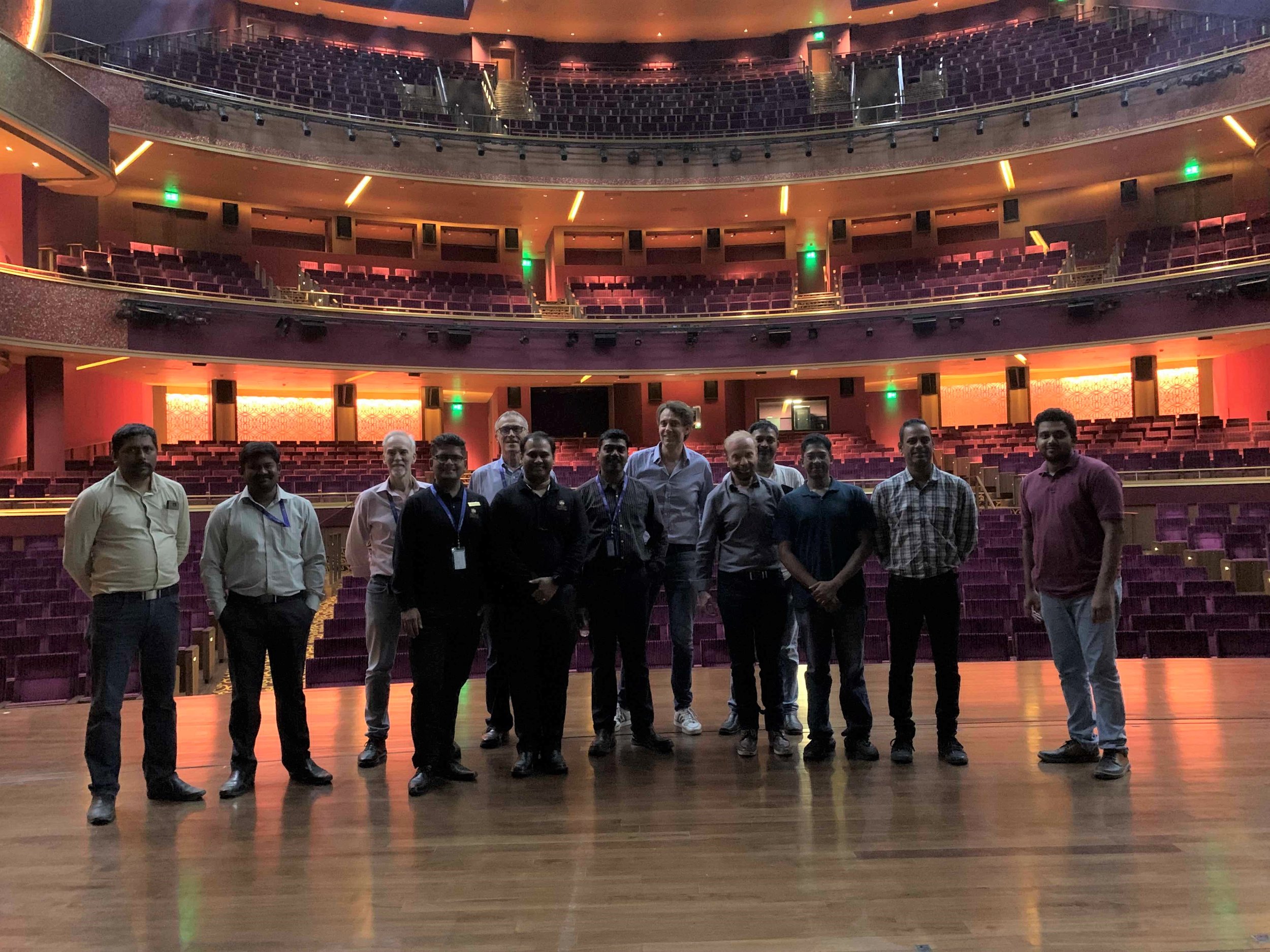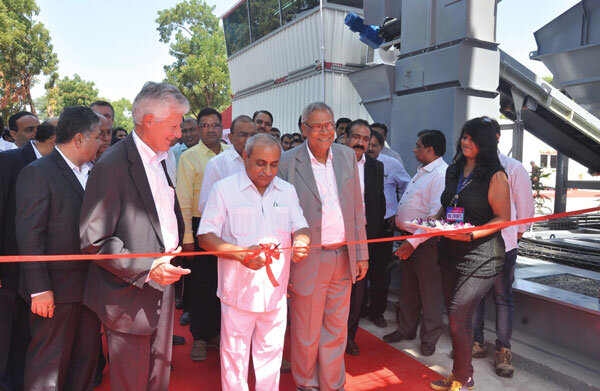The JIO World Centre in the business heart of metropolis Mumbai is the most prestigious convention centre in India and the first Indian customer of the Brabant acoustics specialist SIAP Acoustics. CEO Reinout Gerlach personally took the stand behind the piano to bring in his Indian customer Reliance.
The SIAP and Reliance team together in the concert hall of the JIO World Centre
First contacts with India
SIAP, based in Uden in Brabant, has developed a system with which you can electronically change the acoustics in a room. With this patented system, you can make an unamplified symphony orchestra sound like it is playing in a concert hall or play the sound of a film in surround, drawing the audience completely into the film. SIAP's system is used in various concert halls and arts centres from Amsterdam to New York, Hong Kong and Seoul. "At the beginning of the millennium, we successfully did several, large projects in South Korea," says CEO Reinout Gerlach. "We regularly worked with Samsung subcontractors in these projects. In 2015, Samsung knocked directly on our door. At that time, they were the contractor for the JIO World Center in Mumbai, India and asked us to be their VAS (Virtual Acoustic System) supplier."
Unannounced visit from India
After the first talks with Samsung, it remained quiet for a long time. Samsung's Indian client, Reliance, spoke with several parties who could provide image and sound, but no choice was made. "Reliance is one of the largest companies in India and is run by one of the country's richest families, the Ambanis. They naturally want only the best of the best and a competitive price, so all the major audio-visual companies in the world offered their services to Reliance. We feared that one of our international competitors would get the job." It wasn't until three years later, in 2018, that things started to move when Reliance reported to SIAP at an exhibition in Amsterdam. "They had specially travelled to the Netherlands with 12 people to talk to us about the acoustics of the Jio World Centre in Mumbai and how our system would facilitate the intended multi-purpose use of the hall ."
Playing the piano for an Indian customer
The first conversation between the two parties went well. "We understood how best to behave," says Gerlach. "Not too pedantic, but interested and respectful. That was to their liking." The Indians wanted a demonstration of SIAP's system, and not at a later date so that the company could prepare it calmly, but immediately. "We were totally unprepared for that. The closest system is at the De La Mar Theatre in Amsterdam and luckily, by chance, we were able to get there quickly. "It was all super makeshift. We started by demonstrating the presets for classical music, but that didn't catch on at all - it's not a well-known genre in India. I then decided to take up the piano myself. That worked!"
Also at the JIO World Centre, SIAP CEO Reinout Gerlach played the piano to test the system.
Respect and flexibility
While playing, Gerlach tries to reproduce the typical sounds of Bollywood. "That was really a turning point. The fact that we made an effort to really build a connection by thinking about what music we played was proof to them that we had the right willingness, knowledge, but also attitude to be able to fulfil the assignment. We showed respect and flexibility that other, much bigger international companies apparently had not shown. I think the decision to choose us was made on the spot. "
Negotiating with Indian customers: tough against tough
However, even after the signature of Reliance's CEO, the contract was not yet in: negotiations with Reliance really started then and went hard.
"We were not well prepared for that. In our European view, Indians will go to great lengths to get the best price, almost to the point of rudeness. And because they always come across as very friendly and almost helpful in the rest of the conversations, this really came as a surprise to us. Therefore, start at a price four times higher than you would normally do, so that at least you are not undercutting your cost price. I can only advise other companies to take their time when negotiating."
Local help saves lots of time
For a possible next assignment, Gerlach would definitely enlist local help to take care of all the time-consuming business. "This time we took on all elements of the assignment ourselves, by which I also mean the peripheral issues such as various taxes, visas, permits, bank guarantees and local laws and regulations (safety standards on the work floor there), but we really had a day's work to do. It is actually not worth reinventing the wheel all by yourself, next time we will definitely outsource this and charge much more project hours. Analysis of our time expenditure showed that we had spent at least 400 hours on research and superfluous bureaucracy.
Is your company about to go to India for the first time to explore the market, roll out a first project, or hopefully land your first Indian customer? Then feel free to contact us about how we can help you with all the red tape that comes with doing business in India.
First time in India is a special experience
Last May was finally the day. SIAP travelled to India to install their acoustic system at JIO World Centre. "It was our first time in India, so just landing at the airport in Mumbai felt overwhelming," says Gerlach. The Dutch team had to get used to the Indian service in the beginning. "Everyone wanted to do everything for us; if we had asked them to brush our teeth for us, they would definitely have said 'yes'. But working together was also incredibly nice because of that helpfulness, everyone is constantly on the starting blocks and things are picked up super fast."
SIAP has added special presets in their system that make traditional Indian music sound according to local preferences.
Adapting to local preferences
Not only in the run-up to the project and during the tough price negotiations did Gerlach learn a lot about doing business in India, but also during the testing of the system he came to surprising insights about local preferences. "In the Western world, we have been used to concert halls with their characteristic acoustics for a few centuries. In India, this is completely unknown and music is often played in temples. We found out during testing that they like a lot of reverb for certain types of music, so we made special presets for them with extra reverb for Indian music. Those are special lessons that you pick up from a project like that and hopefully we can take them to the next one."
Wondering about the opportunities in India for your product or company? Check our sector overview to get a better idea of the growth opportunities in India.





